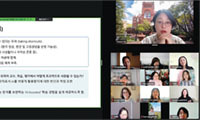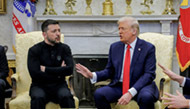Obama Puts His Own Mark on Foreign Policy
WASHINGTON - When he took office last year, President Obama told his foreign policy advisers that he had two baskets of issues to deal with. The first would be the legacy issues left from his predecessor, like Iraq, Afghanistan and America’s image in the world. The second would be his own agenda for the future.
After 15 months addressing the vexing matters he inherited, Mr. Obama is now aggressively advancing his own vision of foreign policy and defining himself more clearly on the world stage. The 47-nation conference on nuclear security he wrapped up recently represented a chance to assert leadership rather than simply showing that he is not George W. Bush.
“Now he’s beginning to get back to the agenda that he came to office to do,” said Nancy E. Soderberg, a former diplomat and now president of The Connect U.S. Fund, a nonprofit group that promotes international engagement. “His legacy in domestic policy is likely to be health care. But his legacy in foreign policy is likely to be this nonproliferation agenda.”
The nuclear summit meeting came after weeks of a more assertive approach to international affairs, as Mr. Obama seeks to demonstrate strength in the face of assumptions overseas that he may be weak. He refused to give in to Russian demands for limits on missile defense and came away with an arms control treaty that, while modest, sets the stage for better relations. He got into high-profile scraps with the leaders of Israel and Afghanistan. And now he faces a critical test of whether he can forge a coalition to impose new sanctions on Iran.
Mr. Obama eventually reached a truce in his clash with President Hamid Karzai of Afghanistan. But during his news conference closing the nuclear meeting, he seemed to signal a renewed determination to reinsert himself into the Israeli-Palestinian dispute.
By describing the long-running conflict as a threat to American security, he effectively adopted the argument of General David H. Petraeus, his Middle East commander, who recently warned that the region’s troubles created a dangerous environment for American troops stationed in nearby Iraq and elsewhere in the area. “It is a vital national security interest of the United States to reduce these conflicts because whether we like it or not, we remain a dominant military superpower,” he said. “And when conflicts break out, one way or another, we get pulled into them. And that ends up costing us significantly in terms of both blood and treasure.”
For most new presidents, foreign policy is a learning experience, and it can take months to feel comfortable in the role of world leader. Advisers said Mr. Obama, like his predecessors, had grown more confident in managing international relations.
But he has learned hard lessons along the way about the limits of his powers of persuasion. He has acknowledged that he underestimated, for instance, just how hard it would be to bring Israelis and Palestinians together, and his engagement with Iran yielded no more cooperation than Mr. Bush’s approach.
If there is an Obama doctrine emerging, it is one much more realpolitik than his predecessor’s, focused on relations with traditional great powers and relegating issues like human rights and democracy to second-tier concerns. He has generated much more good will around the world after years of tension with Mr. Bush, and yet he does not seem to have strong personal friendships with many world leaders.
“Everybody always breaks it down between idealist and realist,” said Rahm Emanuel, the White House chief of staff. “If you had to put him in a category, he’s probably more realpolitik, like Bush 41,” the first President George Bush, Mr. Emanuel said.
He added, “He knows that personal relationships are important, but you’ve got to be cold-blooded about the self-interests of your nation.”
With health care behind him, Mr. Obama has an opportunity to focus on translating his vision for foreign policy into reality. “It’s both strengthened and liberated him so he could deal with other things with wind in his sails,” said Richard N. Haass, a former top official in George W. Bush’s State Department who now leads the Council on Foreign Relations.
The treaty with Russia, the nuclear meeting and other initiatives, he added, are the beginning for Mr. Obama. “These are not transformational developments,” he said, “but in foreign policy it’s important to keep the ball moving down the field in the right direction, and that’s what’s happening.”
Leaders of 47 nations recently gathered in Washington for a nuclear security meeting, one sign of President Obama’s more assertive approach to foreign affairs.
스마터리빙
more [ 건강]
[ 건강]이제 혈관 건강도 챙기자!
[현대해운]우리 눈에 보이지 않기 때문에 혈관 건강을 챙기는 것은 결코 쉽지 않은데요. 여러분은 혈관 건강을 유지하기 위해 어떤 노력을 하시나요?
 [ 건강]
[ 건강]내 몸이 건강해지는 과일궁합
 [ 라이프]
[ 라이프]벌레야 물럿거라! 천연 해충제 만들기
 [ 건강]
[ 건강]혈압 낮추는데 좋은 식품
[현대해운]혈관 건강은 주로 노화가 진행되면서 지켜야 할 문제라고 인식되어 왔습니다. 최근 생활 패턴과 식생활의 변화로 혈관의 노화 진행이 빨라지고
사람·사람들
more많이 본 기사
- 한화 “필리조선소서 미군 핵잠 건조하기 위한 준비 착수”
- 남가주 전역에 ‘물폭탄’… 성탄 연휴 ‘대혼란’
- 백악관, 군에 “베네수엘라 원유 격리하라” 총력 지시
- 트럼프, 李대통령에 ‘백악관 황금열쇠’ 선물… “최고의 협력관계”
- 서태지, 딸·엘리와 1년 만에 근황 “좋은 소식 없어 안타까워”
- 한인타운 한복판 주유소서 강도 ‘칼부림’
- 여성 살해·자녀 납치 한인 ‘수배’
- 중산층이 집을 사지 않는다?… 챗GPT가 내다본 주택시장 미래
- 체포 불체자 수만명 물류창고에 수감 추진
- 최준희, 엄마 故최진실 생일 맞아 추억 “우리 마미 축하”
- [2025년 한 해 ‘진 별’들] 미주 한인사회 원로들 ‘역사의 뒤안길’로
- 北 “신형장거리대공미사일 동해상 시험발사”…김정은 참관
- 지민의 크리스마스 선물, 친필 트리 그림과 귀여움 폭발 셀카…새 인스타 단장
- 로비 단서 혹은 과대포장?…3천쪽 통일교 내부문건 살펴보니
- 오헌, 샌디에고 떠나 피츠버그와 입단 합의… 송성문에겐 기회
- 바야흐로 ‘귀금속 시대’… 금·은·구리까지 사상 최고
- 원·달러 환율, 당국 개입에 42원 폭락
- [유혜미 칼럼] 치솟는 환율, 경제 지표의 역설
- 피클볼이 바꾸는 부동산의 얼굴
- [기고] 안정의 기준은 어떻게 제도가 되었나
- [만화경] 해수부 부산시대
- [스티브 강 ‘인사이드 미국’] 2026 중간선거: 트럼프 지지율 하락이 말해주는 것
- 최강팀 OKC 천적으로 떠오른 샌안토니오… 4패 중 2패 안겨
- [윌셔에서] 우리 안의 ‘생각하는 사람’을 깨울 시간
- [송년 행사] 한미동맹연합회
- 팔레스타인서 구금된 한인 여성 무사 귀환
- 테슬라, “비상사태 시 차문 안 열려”
- 서유리, ♥법조계 남친 데이트 신청에 두근.. “돈은 내가 낸다”
- [성탄절 앞둔 우울한 경제상황] ‘내 코가 석자’… 기부 급감
- 4유닛은 ‘집’이고, 5유닛부터는 ‘사업’이다
- 담합의 독과점법 위반 AB 325
- [성탄절 앞둔 우울한 경제상황] 연말 선물로 중고품 급증
- 첫 드라이브 스루 매장 BBQ, 뉴저지에 첫 개장
- 조지아 역주행 사고, 한인 남편 이어 임신 아내·태아 사망
- 트럼프, GDP 호조에도 “금리 내려야” 압박
- 연말연시, 집 을 생각하다
- [왈가 왈부] 내란재판부·정통망법 또 수정… 졸속·땜질 아닌가요
- 미 조선업 부활 위한 한·미 ‘마스가’ 프로젝트 본격
- 2026년 ‘올해의 컬러’ 전격 공개… 팬톤의 파격적 선택도 포함
- 한글학교 온라인 교사연수 성료
- 뚜레쥬르, 뉴욕시 맨해튼 매장 오픈
- 북한인, 아마존 위장취업 대거 적발
- [송년 행사] LA 코리아타운 라이온스클럽
- 미·중 무역전쟁 휴전 지속… 반도체 관세도 보류
- 내년 회사채 사상 최대 2조2,500억달러 규모
- [송년 행사] LA 북부한인회
- [팜스 카지노 리조트] “새해 맞이는 팜스에서… 푸짐한 행사들과 특별요리”
- 쿡, 나이키 주식 매입 2005년부터 사외이사
- 성탄 전날 LA 일대 폭풍우…돌발 홍수·산사태 경보
- ‘라스베가스에서 만난 한인들’
1/5지식톡

-
 미 육군 사관학교 West Poin…
0
미 육군 사관학교 West Poin…
0https://youtu.be/SxD8cEhNV6Q연락처:wpkapca@gmail.comJohn Choi: 714-716-6414West Point 합격증을 받으셨나요?미 육군사관학교 West Point 학부모 모…
-
 ☝️해외에서도 가능한 한국어 선생님…
0
☝️해외에서도 가능한 한국어 선생님…
0이 영상 하나면 충분합니다!♥️상담신청문의♥️☝️ 문의 폭주로 '선착순 상담'만 진행합니다.☎️ : 02-6213-9094✨카카오톡ID : @GOODEDU77 (@골뱅이 꼭 붙여주셔야합니다…
-
 테슬라 자동차 시트커버 장착
0
테슬라 자동차 시트커버 장착
0테슬라 시트커버, 사놓고 아직 못 씌우셨죠?장착이 생각보다 쉽지 않습니다.20년 경력 전문가에게 맡기세요 — 깔끔하고 딱 맞게 장착해드립니다!장착비용:앞좌석: $40뒷좌석: $60앞·뒷좌석 …
-
 식당용 부탄가스
0
식당용 부탄가스
0식당용 부탄가스 홀세일 합니다 로스앤젤레스 다운타운 픽업 가능 안녕 하세요?강아지 & 고양이 모든 애완동물 / 반려동물 식품 & 모든 애완동물/반려동물 관련 제품들 전문적으로 홀세일/취급하는 회사 입니다 100% …
-
 ACSL 국제 컴퓨터 과학 대회, …
0
ACSL 국제 컴퓨터 과학 대회, …
0웹사이트 : www.eduspot.co.kr 카카오톡 상담하기 : https://pf.kakao.com/_BEQWxb블로그 : https://blog.naver.com/eduspotmain안녕하세요, 에듀스팟입니다…
케이타운 1번가
오피니언
 스티브 강 전 한인민주당협회 회장
스티브 강 전 한인민주당협회 회장 [스티브 강 ‘인사이드 미국’] 2026 중간선거: 트럼프 지지율 하락이 말해주는 것
 김홍일 케이유니콘인베스트먼트 대표
김홍일 케이유니콘인베스트먼트 대표 [기고] 안정의 기준은 어떻게 제도가 되었나
 유혜미 한양대 경제금융대학 교수
유혜미 한양대 경제금융대학 교수 [유혜미 칼럼] 치솟는 환율, 경제 지표의 역설
 성민희 소설·수필가
성민희 소설·수필가 [윌셔에서] 우리 안의 ‘생각하는 사람’을 깨울 시간
 김정곤 / 서울경제 논설위원
김정곤 / 서울경제 논설위원 [만화경] 해수부 부산시대

[왈가 왈부] 내란재판부·정통망법 또 수정… 졸속·땜질 아닌가요
 정숙희 논설위원
정숙희 논설위원온라인쇼핑과 반품, 그리고 그 이후
 파리드 자카리아 / 워싱턴포스트 칼럼니스트 / CNN ‘GPS’ 호스트
파리드 자카리아 / 워싱턴포스트 칼럼니스트 / CNN ‘GPS’ 호스트 트럼프의 새 독트린 “미국을 다시 왜소하게”
 김동찬 시민참여센터 대표
김동찬 시민참여센터 대표 [미국은 지금] MAGA의 분열, 예견된 균열의 시작
1/3지사별 뉴스

“온 세상에 평화를⋯”
숨가쁘게 달려온 2025년을 이제 1주일 남짓 남긴 채 크리스마스 이브를 맞는다. 다사다난했던 한 해를 되돌아보며 마무리하는 연말 시즌과 크리…
H-1B비자 고임금·경력자에 우선권

‘올해는 ICE 이민자 체포 광풍의 해’
올 한해동안 버지니아와 메릴랜드, DC 등에서 연방 이민당국에 체포된 사람이 1만명이 훌쩍 넘는 것으로 조사됐다. 또 미 전국적으로는 22만명…
“ATM기 사용하기 겁나네”

연말 ‘로드레이지’ 비극… 한인 총격 피살
연말을 맞아 도로 위에서 순간적으로 벌어진 운전 중 시비가 40대 한인 가장의 총격 피살 비극으로 이어졌다. 워싱턴주 레이시 경찰국과 서스턴 …
[‘로드 레이지’ 한인 피살 현장 상세 상황] 끼어들기 시비가 비극으로… 차에서 내려 “쏴봐라” 언쟁

오늘 하루 이 창 열지 않음 닫기 






















































.png)


댓글 안에 당신의 성숙함도 담아 주세요.
'오늘의 한마디'는 기사에 대하여 자신의 생각을 말하고 남의 생각을 들으며 서로 다양한 의견을 나누는 공간입니다. 그러나 간혹 불건전한 내용을 올리시는 분들이 계셔서 건전한 인터넷문화 정착을 위해 아래와 같은 운영원칙을 적용합니다.
자체 모니터링을 통해 아래에 해당하는 내용이 포함된 댓글이 발견되면 예고없이 삭제 조치를 하겠습니다.
불건전한 댓글을 올리거나, 이름에 비속어 및 상대방의 불쾌감을 주는 단어를 사용, 유명인 또는 특정 일반인을 사칭하는 경우 이용에 대한 차단 제재를 받을 수 있습니다. 차단될 경우, 일주일간 댓글을 달수 없게 됩니다.
명예훼손, 개인정보 유출, 욕설 등 법률에 위반되는 댓글은 관계 법령에 의거 민형사상 처벌을 받을 수 있으니 이용에 주의를 부탁드립니다.
Close
x